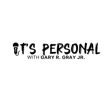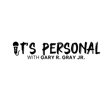Become a Creator today!Start creating today - Share your story with the world!
Start for free
00:00:00
00:00:01

EP. 121 Breanna J. McDaniel hard truths and new books
Breanna J. McDaniel (she/her/hers) is the co-founder of REIYL (Researchers Exploring Inclusive Youth Literature) and an author. She’s published in myriad academic journals, an academic anthology and her debut picture book Hands Up! was published with Dial Books in 2019, while her newest picture book Impossible Moon was published with Denene Millner Books in June of 2022.
She has five forthcoming picture books, one with Dial GO FORTH AND TELL: The Life of August Baker, Librarian and Master Storyteller coming in February of 2024 and Cute Toot with Henry Holt Books for Young Readers in the Spring of 2024.
On ItsPersonal Breanna chats about growing up in the South, hard truths about her current position with education, and her soon-to-be-published picture book, Cute Toot. A podcast conversation, you do not want to miss.
Website: https://www.breannajmcdaniel.com/
Instagram: https://www.instagram.com/bremacbooks/
Transcript
Introduction to 'It's Personal'
00:00:01
Speaker
Hey, what's up, everyone? Welcome to It's Personal, a podcast about creators and their stories. Welcome. Welcome back, everyone, to Just Got On. We had a little technical tear.
00:00:27
Speaker
I have another amazing guest today.
Meet Brianna J. McDaniel
00:00:30
Speaker
Sure. I'm Brianna J. McDaniel and I'm an author. Brianna, how are things going?
00:00:39
Speaker
Oh, no. Give it to me. Give it to me. I didn't expect that question. I'm so sorry. Oh, my gosh. It's OK. I love your honesty. And we can. Let's get it. I mean, if you're comfortable, let's get into it. Like, what's been. I did not expect that question.
Balancing Academia and Writing
00:01:02
Speaker
Um, so I'm a recovering academic and just trying to figure out what my place in the world is. And so I took this job that's not going great. Um, and it is a very, it's a time intensive job and all I really want to be doing right now is writing. I'm working on a novel and
00:01:23
Speaker
I can't do that because there's so much connected to this job that was supposed to be my transition out of academia. And then we were like, there's like a lot of stuff that's juggling and moving around with this job. And so in the midst of that, though, I have a book coming out next year called Cute 2. It's about two sisters who have a fighting contest.
00:01:44
Speaker
I think I kind of knew that it probably wasn't going to be everybody's cup of tea, right? Sure. Two sisters, I'm going to bring contest. But I don't think what I, I think something that I wasn't really expecting was how respectability politics could play into the fact that I, a Black woman, am writing potty humor for Black children.
00:02:07
Speaker
And so I've had some, we'll call them responses to me writing this book and this book on its way out, being birthed into the world.
The Essence of Writing for Brianna
00:02:17
Speaker
And like one response in particular just had me crying. And I was just like, did I make the wrong decision?
00:02:24
Speaker
And not about the book, but about like writing. Did I make the wrong decision about like, you know, deciding that whatever I do for like the day job that I have is only going to be there to, you know, make a living. But writing for me is about making life my life and giving myself life. Writing is so personal and I write for a lot of people, but I really write for myself.
00:02:51
Speaker
um and so yeah that's been the last like three weeks of my life just so i'm i'm uh i appreciate you like your vulnerability i mean i i want to apologize so i do appreciate your i will say i've seen from you that we do need you as a writer we do need you as someone who is giving literature for our children
00:03:16
Speaker
um and for educators like much is saying this because of that but i use your books so take i mean for what it's whatever it's worth honestly i i do feel like that's hard that's really really hard
00:03:30
Speaker
because you can hear the struggle between, you know, the outside world and the idea of a nine to five and the writing world isn't as, it's not as traditional as other jobs as well. I noticed that you most recently in 2022 got your PhD, but like it is, you know, academia is a weird, very restful, you know,
00:03:53
Speaker
It's all the things. It's all the things, right? So I get you and I hear you completely.
Childhood and Atlanta Roots
00:03:59
Speaker
I guess my question, my follow-up question is, you know, I want to know more about know that Atlanta. What was it like?
00:04:07
Speaker
Um, yeah, so I grew up in Atlanta and I'm in Atlanta right now. And I think wherever I go, all the travels I've had, all the places I've been to and lived for my PhD, for my master's degree, for this job that I have, um, my compass rose always kind of brings me back to Atlanta. And I think part of that is because most of my family is here.
00:04:33
Speaker
And growing up, I have two sisters, two sisters by my, that are, we both have the same parents. And then I have other siblings that are my father's kids who I'm still getting to know as an adult. And then I have a load of cousins, so many cousins, cousins on cousins on cousins. And we just kind of grew up together. We all,
00:04:58
Speaker
were like kind of smashed into this area of Atlanta and just yeah I think my childhood was really I think different from what maybe people might imagine for folks growing up in the South. But sometimes I talk to people
00:05:14
Speaker
And I think that they still imagine, like, the South, the American South, as, like, both under him I cry. Like, they're like, so Cassie Logan, that's you, right? And I'm like, yes. But also, I'm not living through, you know, the, I am in the afterlife of slavery, definitely. But, like, we have TVs, you know, and stuff like that.
00:05:40
Speaker
I know that sounds weird, but seriously, when I moved to Boston for my master's degree, just a thing that people thought about Atlanta or the South generally, really, you know, was centralized around racism and, you know, being black in the South and what they thought they knew or understood about that. Boston was a tough place to be black, by the way. So I was like, I don't know who to make a person's friends.
00:06:10
Speaker
But I had a good life. My mom worked all the time. But like I said, there were so many cousins and so much family around all the time that I just had a very full life. And I think, like I say, there's a lot to folks because we did not have any money growing up, like zero dollars. And I remember distinctly wanting to go to Tybee Island when I was in fifth grade. I was in the Talented and Gifted program.
00:06:36
Speaker
It costs $125 for each student who was in the talented and gifted program to go to Tybee Island. And it was an overnight trip. Everybody went, felt like everybody went, but we just didn't have it. We just didn't have it. So I didn't go. So every single last year of college, where did I go for spring break? Everybody's like, let's go to college, baby.
00:06:58
Speaker
My friends were like, I was like, I mean, let's go to Savannah. Because my cousin went to Savannah State, though. But we didn't, so we didn't have, you know, like just even for special occasions, there just wasn't much to go around. But what I loved about my mom and how I felt spoiled as a child was that she never
00:07:16
Speaker
like, forced us to do anything that we didn't want to do, including eating food we didn't want. And I am a picky eater. Well, not so much as an adult. I'm like, yeah, I'll taste it. But she never made us, like, eat things that we didn't want to eat, which is very different for a lot of people in the South. So if I would be like, nah, I'm not going to eat that because I don't have to. People are, like, shouting at you? You're just not going to eat food as a bunny? I'm like, no, I'm not.
Influence of Black Women in Brianna's Life
00:07:44
Speaker
So I feel like I just had a very, I had an experience as a child where I got to make a lot of decisions for myself that I don't think a lot of people maybe would have allowed a child to make. My mom was not big on like, what are you reading? I think once I started reading a lot of Mary Higgins Clark, she was like, oh no, should I be paying more attention? And I was like, you're good. She was like,
00:08:09
Speaker
Okay. But she was just, you know, she listened, you know, she's always been a good listener and like a good like reflective person to have in your life. And I think that kind of translated to her allowing us to ask questions, make decisions in spaces where a lot of other people were like, stay in a child's place. Wow. You speak so highly of Black men in general.
00:08:35
Speaker
um obviously your mom um what how has and i think you kind of said it but i guess my my other question is who are some other black women who have influenced you including your mom and how have they like impacted the work that you do yeah i mean so i grew up my grandmother was like the head of our family and there were men around but they were very like i
00:09:02
Speaker
I think probably the man who's had the most impact on me is my Uncle Tim. He taught me how to scale fish, which was a disgusting experience, but one that I've since used in like more than I thought I would ever use. He came to my graduation, the dozen roses, and like a bone on his hip and a holster. I think a lot of us have had that, Uncle.
00:09:30
Speaker
And then he's like, let's take a picture. This is at my graduation. He's like, let's take a picture. And then he turns and pulls out a digital camera. And I was like, what's your phone for though?
00:09:41
Speaker
He's like, don't make fun of me. So like, I just, I want to like, you know, cause I know a lot of folks might have different thoughts about, you know, black women being so centralized in folks spaces. But so I want to confirm that like I have black men in my life who love me, who've been there for me throughout my life. But yeah, black women just have always been
00:10:02
Speaker
at the forefront of everything that I've done because they've been, I think this is maybe might be a different answer for them from what a lot of people would present, but they are so considerate. At least the black women I've had in my life are so considerate and they're just very thoughtful people. And I don't want to lionize the women in my life because they're not perfect, nor have they always made the best decisions.
00:10:28
Speaker
I think as an adult, I'm learning more as they talk to me more, like as an adult to an adult. My aunts are a big part of that. One of my aunts is the first person who talked to me about depression. And so honestly, I was able to recognize when I first entered into a deep state of depression, what was happening because she had talked to me about it like a long time ago. And so my mom's sisters have been a big part of that.
00:10:58
Speaker
um my grandmother had a sister and then two cousins that they grew up like sisters and those are my auntie Noreen and my auntie Annabelle and what they gave me more than anything that was so important was the idea of story and story being important to us continuing to have connections throughout generations and so if I were to like pinpoint where my
00:11:23
Speaker
The idea that story was really critical for us as Black people, generally, it would start with my auntie Annabelle and with my grandmother because they had stories for every experience that I had growing up. And so something would happen. Like one day my mom, I think she left my grandmother's house. We had an argument.
00:11:39
Speaker
She left my grandmother's house and she left without saying goodbye. I love you and giving me a hug and a kiss. And I was like, oh, so she don't love me no more. So let's just be real about it. And my grandmother was like, you might be a little bit dramatic. She's upset. She's allowed to be upset. And then she was talking to my auntie Annabelle and my auntie was like, let me talk to Brianna. And she told me this story where she was like, my mom had upset me. She had sent me to go get some
00:12:05
Speaker
bread and some milk from the store. And then I came back and she had told me that, you know, she told me to do more than just get the bread and milk. And she said, now Brianna, I know what she told me to do because I listened. And I did what she told me to do. She said, and then, you know, a week later, get passed away.
00:12:24
Speaker
And I was like, didn't I see, you know, that she's, and I'm like, really? And she's like, what I'm trying to tell you is we don't need to sit in our anger. You don't need to sit in our disappointment. You know, she said, give yourself time to go through your feelings, but don't sit in it because you never know how things kind of will move.
00:12:44
Speaker
through life unexpectedly. And so very young, at a very young age, I was learning and hearing stories that were helping me to manage my emotions in different ways. There's this woman, Diana Mitchell, and I had been offered a scholarship to go to a private school in Atlanta right before high school. And she told me, she was an educator, and she told me
00:13:08
Speaker
She said, I think you can go to this private school. She said, and I know you do really well. And I said, oh, thank you. What's that? She said, but you would be a big fish in a small pond. She said, and I think I see for you an opportunity to challenge yourself and move yourself through different paces at different opportunities that will only be offered at a public school. She said, now there you might be a big fish in a big pond.
00:13:35
Speaker
but that's just more space for you to explore. And I held this woman, and I still do, because like I said, there wasn't much to go around as far as money is concerned. And clothes in particular were not something that we got every year, even though we were growing kids. And my big sister is smaller than me, so she wasn't passing nothing down.
00:13:56
Speaker
because we not the same, nothing. And so Diana Mitchell, Ms. Mitchell, one day I was outside of church after choir rehearsal. I grew up Seventh-day at Venice. So it was a Friday evening.
00:14:11
Speaker
And I was outside playing the C Frost, you know, like the air was blowing. She took her coat off and it was a very stylish, old Navy bubble coat. You remember when folks used to be wearing the bubble coats? I remember it. That was the style.
00:14:27
Speaker
I was in. She took her coat off and gave it to me. And I was like, she literally is taking stuff off her back. So when she was giving me advice about education and where to go, I listened because her spirit, not just her generosity, but her spirit of care and again, consideration was
Educational Influences from Community
00:14:44
Speaker
something that I wanted to embody. And I felt like if she's telling me this is where I might get,
00:14:49
Speaker
more opportunity to find this space. And I don't know that I would have defined it like that, like, find compassion and, like, learn these skills that I thought were so important that she had. I was like, well, I'll go wherever she wants me to go. And so I feel really honored to have just, like, grown up where I have, where I've been surrounded by Black women who have moved things through their own life and really, again, taken in what's happened in their life.
00:15:18
Speaker
and import life into me based on what they've learned. So I'll stop. I can talk. You gotta stop me. Here you gotta stop me. I love listening to see how impactful people can be on someone. Like listening to you talk about or it's like I can truly hear it in your voice how important she was to you.
00:15:40
Speaker
Everyone doesn't get that, right? Everyone doesn't get that. And that only happens, I believe, is through consistency, right? They are constantly doing the things to make you, whether it's feel comfortable, also feel uncomfortable, like all the stuff, right? So I love, you could talk.
00:16:00
Speaker
I want to talk more about like your siblings. So I don't know what the age range in regards to siblings. Did you spend time in school with your siblings? I did not. My little sister is maybe is two years younger than me and my older sister is four years older than me. And so by the time and I was in a centric child, let's put it like that. And so on
00:16:26
Speaker
like sandwiched in between two very like kind of, you know, both of my sisters played sports. I play volleyball, which is definitely a sport, but like my sister, my older sister could have been in Olympic and my younger sister was very cool and very, you know, in tune with like different cultural experiences that were happening where we grew up and went to school, which is in Fairburn, Georgia.
00:16:53
Speaker
which is a rural area. And so, yeah, I think I was very sandwiched in between them. I was a theater kid, and I tried everything. And I was really into school, so I did a lot of AP classes, that sort of thing. And on either side of that, my sisters were also trying different things, but like,
00:17:15
Speaker
connected to their experiences, more so through community. And I was a little bit more individualistic. Also though, following my older sister through high school, which I did, was an experience because even though she is smaller than me, she's very petite, she was very popular. And I had all the same teachers as her. There were still staff members there. Right, so she's smaller than me, but people are calling me Lil Bethany.
00:17:43
Speaker
I'm like, please stop calling me that, all throughout high school. Lil Bethany, again, I have my own name. It is definitely Brianna. But me and my sisters, at least growing up, because there was stuff that happened in our home that I think was sometimes very hard to understand and connect with, particularly when it came to my father. We agreed to protect each other. We spent a lot of time at home with each other.
00:18:11
Speaker
um you know we weren't allowed to do a lot of sleepovers and stuff like that growing up so we were each other's friends um so lots of laughter lots of laughter a lot of um playing games like we played checkers oh my god i feel like i can tell as soon as you said checkers you like like this
00:18:32
Speaker
I can tell. And now my nephew, because I bought him one of those big giant checkerboards. He loves to play checkers. And he's like, can you teach me how to play checkers? And I'm like, yeah, it's just I've been playing checkers my whole life. And then he wants to play it all the time. And the thing is, you're six and I love you, but I'm not going to let you win.
00:18:59
Speaker
So he doesn't win often, but we celebrate big when he wins. And he's unfortunately, he's not a great loser. He's like, I don't understand. He gets mad. But I also am not a great loser. I, however, will like flip boards. Definitely do that. He is not there. And I try, I'm trying to make sure he's never, you know, sorry, because
00:19:24
Speaker
I hate to lose sorry. I love that you are and honestly that just makes me think a lot about like what we talked about at the beginning like when you talked about like the books that you want to write like I the first thing I thought about like my first initial reaction was like white people can do it and no one says anything.
00:19:42
Speaker
That was my first initial thought. I was like, they can humor the most like absurd things in the world and people congratulate, people celebrate. But as soon as someone like us, you know, tries to step into that, like I've
00:19:58
Speaker
What you're writing, it made me feel so many things, but I know what's happening. And then on top of that, I feel like you've said this, but please correct me if I'm wrong. Our own people will say things that you're like, really? Like here I am trying to celebrate and enjoy and spread humor for our kids. And you're finding ways to like bring me down. But at the same time, so-and-so is doing it over here and over here.
00:20:23
Speaker
and no one's saying anything so why can't I like what what makes why can't I be in it's just it's very very bizarre too but the competitiveness going back to that it makes me think of you know like you are doing things like doing that and writing about that is like it's a game changer right like I don't know a lot of like honestly like I mean I don't know a lot of like black humor picture books you know what I mean like they're out there but they're not like so explicitly written all the time like when I see lots of books from like black authors if I'm being honest like
00:20:53
Speaker
Yeah, they're amazing books, but we are also sometimes asked to or like, you know, sometimes volunteered to in other ways. Like, we need to write about the hard stuff. We need to write about like, all, you know, all the stuff. So I love that, you know, that are like, you shouldn't be doing this, whatever. It just, but I'm glad that you're doing really, really, I'll have it. I'll put it in my class.
00:21:15
Speaker
I'll tell you that. I'll have it in my class and my kids will love every you already know. That's why you're writing the book. You know, they're gonna love that story. They're gonna love that 100%. I mean, that's what I'm hoping. And that's where I've like had to pivot. Because I think, you know, as authors, we are very excited about the opportunity to connect with our community.
00:21:39
Speaker
at multi-generational levels, right? And so, sure, I would like for people who, you know, I would like for lots of people to engage with the book and appreciate the book, but I have, I'm trying now to sit in a place of comfort with if one black kid like sees this book and sees himself and sees the laughter and sees the competition, right? Like it's a part contest. It's not just them.
00:22:07
Speaker
You know, and I didn't say black respectively politics, but I did mean blacks respectability politics. I knew I
00:22:16
Speaker
And the thing I'm pushing against really is the idea that I can't write anything, which is what it feels like I'm being told is like, well, these are the kind of stories we really would want to promote and that we would hope would resonate with kids. And I get that and I celebrate that. And I'm happy that we have been, I think, blessed to have decades now
00:22:40
Speaker
I mean, that really doesn't sound like a lot, but like decades worth a really excellent picture books, but this is an excellent picture book too, because excellent is a spectrum.
00:22:52
Speaker
of experiences. And yeah, the idea that I should be writing or I can only write one type of book, one type of experience is unnerving to me because what I think true liberation, at least for me, looks like is the ability to experiment and to try and to push and to challenge and
00:23:15
Speaker
to tell me or for me to, you know, have this experience of folks saying, is that what you really want to do? Yes, because, you know, the limit doesn't exist for me. It's how I feel. And I can write what I want. It's my body. I do not want.
00:23:30
Speaker
I used to say that a lot growing up, and I say this all respectfully, because I can understand, you know, when we look at the history of Black folks in America and think about respectability politics, like I get it.
00:23:45
Speaker
I wrote a whole thesis about it, to be honest, a whole dissertation about it. Disruption is more along with anything that I will ever, like, I'm not going to fit always. And even when I fit, I'm not going to fit. So might as well, might as well disrupt, you know. And that's the other part. It's like people who are, I don't know, I don't know the story, but as I'm listening to, it's like people who are making these, they don't know you.
00:24:13
Speaker
like they don't even know you so it's like like who are you to say like what i'm doing is going to be like really just everything so poorly it's it it
00:24:27
Speaker
it is sad that I'm sorry that you were having to go through that because I'm a third grade teacher and my kids know like you like that's all they talk about is competition, farting, pooing like that is what gets them going and then to have that story to have there's like come on like come on like
00:24:50
Speaker
Black sisters, you know? And they're like duking it out with their parts, which is accurate. Like, you know, my sisters may not appreciate this, but like we definitely, it was definitely like, it's like, mom, she just farted on me. Why would she do that? She just passed gas. And then it's like, you know, let me just- I've been there. I get it.
00:25:12
Speaker
I have been there. I'll tell you, I can message family members because it's right now. And I'm telling you, they would be like, yep, we did it. We remember it. I can remember it like I'm not when you're like, it's bringing it's bringing back memories. Like when you're talking about this stuff, I'm like, yep, it is so true. And why not have a story about it? Like, yeah.
00:25:33
Speaker
I'm excited for you. I'm very, very excited for you. Oh, I have a couple, just a couple, a couple more questions. Sure. You have, and then most, you have a lot of books coming, a lot of books, but you most recently have Impossible Moon.
Inspiration for 'Impossible Moon'
00:25:47
Speaker
Tell me about it. Tell me a little bit about it. Yeah. So Impossible Moon, I wrote for my grandmother. And, you know, it was, the book was inspired by me being a Scotland, like speaking of home spaces,
00:26:01
Speaker
Glasgow Scotland has very interestingly become like a very like a space where I can feel like really connected to.
00:26:12
Speaker
community into, um, the land and like, it's really, it is kind of feels sometimes like I'm in the South sometimes when I'm in Glasgow. So it was really interesting. But I was there, I was at a farmhouse and the moon that I was looking at was so big and all I wanted to do was touch it. And I was, my grandmother had just fallen ill. My grandmother, I don't think I'm in a good place to be able to talk to about her as fully as I usually can.
00:26:39
Speaker
But she's very important to me, always has and always will be very important to me. And so I wrote this book for her because I imagined her touching the moon, and me touching the same moon and like, you know, we just, it felt like the moon was connecting us in the space that I was in.
00:26:56
Speaker
I wrote this story about a little girl whose grandmother was also sick and how if she touched the moon, there could be the possibility that she can make her, you know, make her grandmother well. And I've always, I wanted to be the astronomer growing up and was told it wasn't possible for me. This is why I fight so hard against people telling me what I can and cannot do or what I should and shouldn't I do. I won't say people have told me I can't do stuff, but like, should you do this sort of thing?
00:27:25
Speaker
And so, yeah, the possibilities of this being, you know, maybe an impossible task for this little girl was a part of where the title came from. But it's a story about grief. And I try to make sure people understand that because I think a lot of folks look at the output of a lot of the books that we do as authors and we present as creatives. And they always, I mean, they might, if a book is joyful, you know, they'll assign it
00:27:53
Speaker
you know, the roots of it to a certain emotion. But Hands Up, Impossible Moon, Cute Tute, and then Promise Me World. So those are some of my books that are coming out.
00:28:04
Speaker
Q2 and Promise Me World are some books that are coming out. All of those books are rooted in grief. So even this book about this FARC contest came out of grief. And I hope that there can be a day where not all of my books are rooted in grief, even if they're expressive of other emotions. But right now, that's where they're coming from.
00:28:27
Speaker
And I think that's okay, right? Yeah. I think that's okay. I think that's where the best, I mean, I'm still very early in my journey, but I feel like that's when I talk to authors and other creatives, their best work comes from places, unfortunately, some of their best work comes from places of grief or trauma. Because I know that that process of you writing that book or drafting that book, whatever the case may be, is not because you are revisiting
00:28:56
Speaker
revisiting, revisiting again. So I appreciate that because for an educator on the outside of that experience, I get to reap the benefits of all those things, right? Which is, you know, it's hard, but I do get to see that final process, a book with, you know, that's polished and gone through all those things. And I think sometimes I always tell my kids because
00:29:20
Speaker
I've gone through this process. We tend to just believe that sometimes kids tend to believe if teachers are unable to or forget to talk to kids about what they go through to get to. And it's not all books, but most books go through a phase where like the author is going through or thinking about moments in time where they were sad or angry, et cetera. Because kids forget, right? Kids forget that adults have feelings and things are a process. Yeah, thank you.
00:29:46
Speaker
I appreciate your expansion of this conversation because that's so important. This has been amazing. Where can people find you online? So you can find me on Instagram, rarely, but I'm there at Bremack Books. You didn't go to my web. I know this is terrible though because people, I just happened to be, what happened with you was that somebody had
00:30:14
Speaker
sent me a message a week before I actually checked my messages. And it was for an event that was coming up in a couple of days. And they were like, Hey, I just am reaching out again. And I was like, Oh, no. So now I'm like, I have to check my messages because I never know. But I am so, you know, I am so rarely on
00:30:34
Speaker
these websites and I need to like up my presence, I think, because I'm starting to realize how critical those spaces are when it comes to presenting different, you know, different information. But I use it mainly for professional purposes because I, you know, just feel like
00:30:51
Speaker
people have a lot of access to just like generally like black people's grief they have a lot of access to they have a lot of access to a lot of the emotional experiences of folks and so much of that i am realizing i would like to give myself more time to connect with and understand before other people have access to it um so anyway you didn't ask that people can find me
Contact and Social Media Preferences
00:31:17
Speaker
at Bremag Books on Instagram, BriannaJMcDaniel.com. And then, you know, check out Bookshop for, I will answer you if you send me a message on Instagram or via email. I'm always on my email though. People email me. I'll probably be able to get back to you faster. Yeah. I appreciate you. I appreciate you. This is so much fun.





